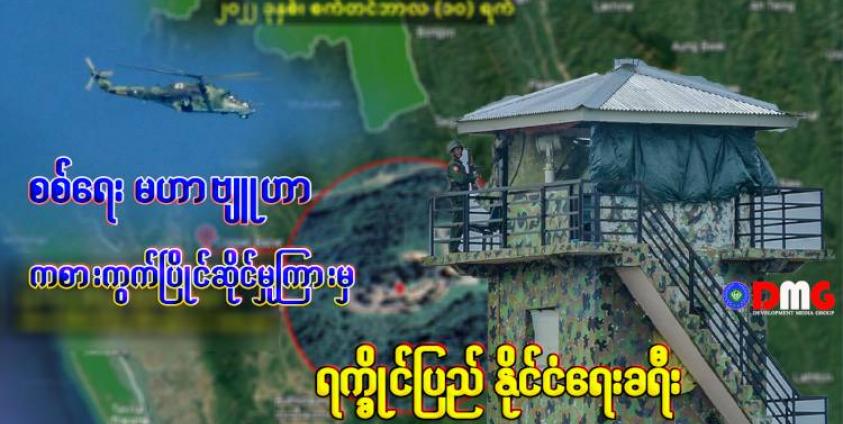Since July early 2022, there has been a resurgence of military conflict between the Arakan Army (AA) and the Military Council, with the AA successfully capturing a string of military outposts pushing SAC regime forces to retreat towards their urban strongholds especially
Maungdaw.
Claiming they already control 60% of northern Rakhine, an increasingly confident AA has adopted a flexible strategy that the Military Council has failed to understand as they advance towards their objective of full sovereignty and independence.
After the loss of 36 military outposts in Rakhine including positions along the Rakhine- Bangladesh border, the Military Council has adopted a twofold strategy:
First :in military engagements they increasingly rely on air support and also request for the safe escort of military units in transit.
The second part of their strategy is to reinforce their reinforced their presence in Maungdaw Township, and block all land routes and waterways connecting Rathedaung, Buthidaung and Maungdaw. However even this defensive strategy has been undermined by AA operations.
The Tatamadaw restricts public travel and the distribution and flow of goods including food in an attempt to cut off those 3 townships as an ‘inner circle’ under military control. However, the AA has surrounded the ‘outer circle’ of these townships in a containment operation of the regime’s troops. This has resulted in a counter siege from the outer circle that has resulted in their military bases also ironically suffering food shortages. Other Military Council strongholds in their hands are townships such as Mrauk-U, Kyauktaw and Minbya.
Due to the mounting casualties on the battlefield, the Military Council troops are desperately bringing back old veterans into some in their infantry divisions. In addition, secret information is constantly being leaked, and the AA is very much in control of the information war.
The AA and the Military Council – two very different fighting forces.
On the one hand the Military Council is increasing stockpiles of large amounts of weapons and ammunition in Rakhine State, but they have still failed to plan an offensive. At the moment they focus on conducting arrests of AA-affiliated people, patrolling, and checking the overnight guest lists in urban areas. This means their soldiers are primarily deployed in targeting civilians.
Although the Military Council by conducting raids on civilians has attempted to lure the AA to fight in the villages, AA seemed to understand this strategy in advance, and adroitly avoided the fighting in the residential areas, which would cause many civilian deaths. The Military Council troops tried to provoke AA by artillery shelling the villages and residential areas. However, knowing that the locals would suffer if there was a battle in those areas, the AA avoided clashes in residential and populated areas.
To explain AA's military strategy, a phrase that AA commander-in-chief always says should be mentioned, a phrase frequently used by the Commander-in-Chief is, "You have to do your homework." AA has many outstanding commanders, and recruits an abundance of young, disciplined, and loyal soldiers.
When the Military Council attempted to recapture lost army outposts, regime troops used artillery bombardments and air raids. But when artillery shells landed on the territory of Bangladesh, tensions between the two countries arose. The Military Council, which has been ostracized internationally, has once again received criticism from the Bangladesh government which threatened to take the issue to the United Nations. Due to AA's shrewd guerilla tactics, the Military Council is still struggling to formulate a strong strategy
Future directions of the struggle
The Military Council already weakened by the economic crisis is also losing in the ongoing war in Rakhine.
This means that the Military Council is facing a situation where it could be defeated not only in Rakhine but in the entire country. The Military Council has followed two paths to perpetuate its political survival. The first one is political discussion with Ethnic Armed Organizations (EAOs,) and the second one is to hold an election.
However, two NCA meetings conducted by the Military Council did not yield any results. At the same time, the areas controlled by the Military Council are shrinking day by day, so there is a high possibility that the election cannot be held in many parts of the country given their shrinking area of authority and administrative control.
The AA is still marching towards a fully autonomous confederation system with almost no central control, as it has previously proclaimed. They are also strengthening the administrative and judicial sectors to be more stable and solid.
Looking at the current situation, it is likely that AA's political objectives will continue in the direction of establishing a confederation and the independence of Rakhine state, taking advantage of the crisis of the Military Council. As a consequence of the coup, the Military Council was facing various crises, and AA used the situation as an opportunity to strengthen its political and military foundation and was also able to gather allies.
There is no doubt that the Military Council has suffered greatly due to AA's strategies during the renewed fighting in Rakhine State. Without doubt the military and political strategies implemented by AA will lead to the genuine liberation of Rakhine State.
edit by TF








